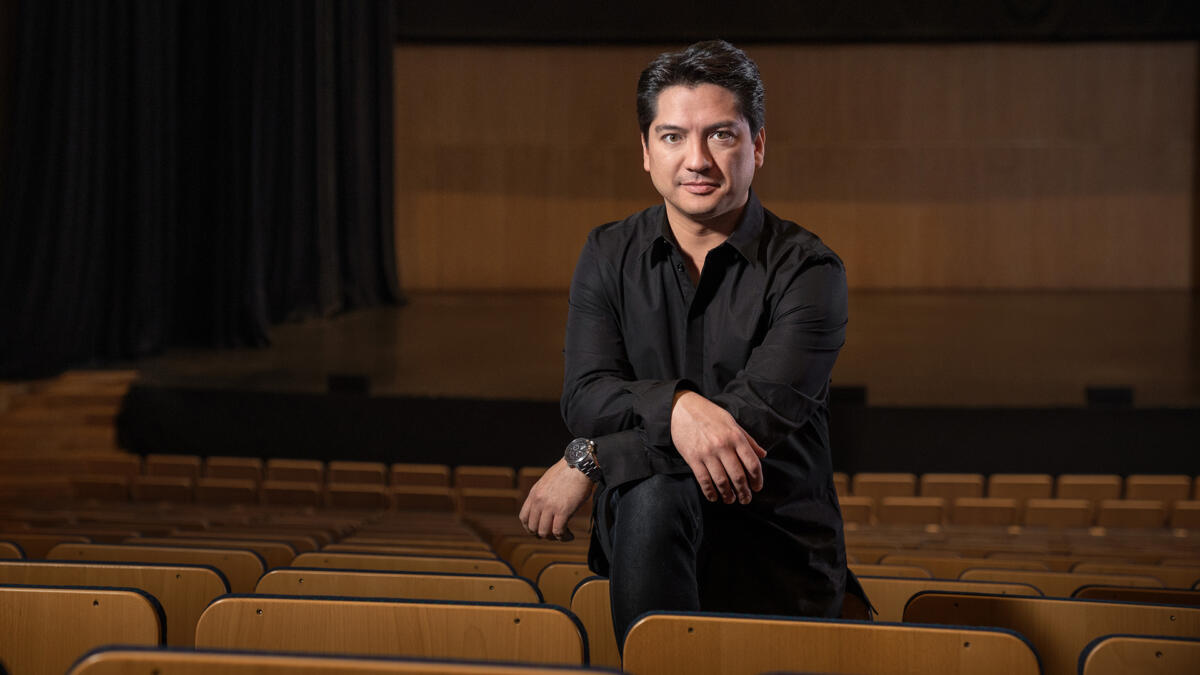Studia Generalia: A New Romanticism
Conductor Eugene Tzigane: Reclaiming the 19th Century Tools of Musical Storytelling and Narrative

The lecture is in English.
Over the last century, orchestras, conductors, and soloists have come to sound eerily similar. While technical brilliance has reached historically unimaginable heights, a trend towards homogeneity has come to dominate. The rigorous musical training of the last century, with its emphasis on technical perfection and faithful adherence to a composer’s “intentions,” has undoubtedly raised technical standards to breathtaking heights. Yet, this pursuit of objectivity and flawless execution has stifled individuality and creative expression, leading to a homogeneous musical sound-culture that transcends geographic boundaries. This disheartening uniformity stems from a confluence of forces: Globalization, the Culture Industry, and the Lingering Shadow of Modernism.
However, homogeneity was not always the norm. In the long 19th century (approx.1800–1914), the classical music world was a vibrant tapestry of diverse voices and styles. The Romantic movement elevated musicians from humble servant to celebrated artist. Cultures came to value individuality and creative genius more than anything else. Thanks to their revolutionary ideas and techniques for musical storytelling, avant-garde New German School became the most influential and dominant camp in what was called the War of the Romantics.
Conductor Eugene Tzigane will discuss and demonstrate these techniques that separated the NGS from the conservatives and argue that we need these tools now more than ever in order to escape the gravitational pull of musical Modernism.
Eugene Tzigane, conductor
Eugene Tziganen began his studies at Juilliard, New York. The connection to the Nordic countries was created as a student of Jorma Panula at the Royal College of Music in Stockholm. The connection was further strengthened when Tzigane was elected Chief Conductor of the Kuopio City Orchestra.
Eugene Tzigane’s international career was launched at the 2008 Solti Conducting Competition, the second place of which immediately led to collaboration with Deutsches Symphonie-Orchester Berlin, the Frankfurt Radio Symphony Orchestra and the Nordwestdeutsche (NWD) Philharmonie, of which Tzigane was chief conductor until 2014.
Tzigane, who grew up on both sides of the Pacific Ocean and has long been active in Europe, has partnered with several established and internationally acclaimed orchestras around the world. He has conducted the Kuopio City Orchestra several times since 2015.
Further information: Jan Lehtola, jan.Lehtola@uniarts.fi
Changes are possible.
The lecture is in English.
Over the last century, orchestras, conductors, and soloists have come to sound eerily similar. While technical brilliance has reached historically unimaginable heights, a trend towards homogeneity has come to dominate. The rigorous musical training of the last century, with its emphasis on technical perfection and faithful adherence to a composer’s “intentions,” has undoubtedly raised technical standards to breathtaking heights. Yet, this pursuit of objectivity and flawless execution has stifled individuality and creative expression, leading to a homogeneous musical sound-culture that transcends geographic boundaries. This disheartening uniformity stems from a confluence of forces: Globalization, the Culture Industry, and the Lingering Shadow of Modernism.
However, homogeneity was not always the norm. In the long 19th century (approx.1800–1914), the classical music world was a vibrant tapestry of diverse voices and styles. The Romantic movement elevated musicians from humble servant to celebrated artist. Cultures came to value individuality and creative genius more than anything else. Thanks to their revolutionary ideas and techniques for musical storytelling, avant-garde New German School became the most influential and dominant camp in what was called the War of the Romantics.
Conductor Eugene Tzigane will discuss and demonstrate these techniques that separated the NGS from the conservatives and argue that we need these tools now more than ever in order to escape the gravitational pull of musical Modernism.
Eugene Tzigane, conductor
Eugene Tziganen began his studies at Juilliard, New York. The connection to the Nordic countries was created as a student of Jorma Panula at the Royal College of Music in Stockholm. The connection was further strengthened when Tzigane was elected Chief Conductor of the Kuopio City Orchestra.
Eugene Tzigane’s international career was launched at the 2008 Solti Conducting Competition, the second place of which immediately led to collaboration with Deutsches Symphonie-Orchester Berlin, the Frankfurt Radio Symphony Orchestra and the Nordwestdeutsche (NWD) Philharmonie, of which Tzigane was chief conductor until 2014.
Tzigane, who grew up on both sides of the Pacific Ocean and has long been active in Europe, has partnered with several established and internationally acclaimed orchestras around the world. He has conducted the Kuopio City Orchestra several times since 2015.
Further information: Jan Lehtola, jan.Lehtola@uniarts.fi
Changes are possible.